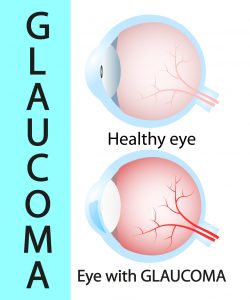Tunnel vision is usually used to describe someone with a narrow point of view. Taken literally however, it can describe the type of vision that results with untreated glaucoma. With eye injury prevention month coming to a close next week, it seemed right to talk about ways to prevent glaucoma. This is because those with eye injury are at a higher risk of developing this condition. A recent study has found that turmeric, a natural spice, may be the golden ticket to potentially prevent glaucoma and preserve eye health.
 What is glaucoma?
What is glaucoma?
Glaucoma is not just one eye condition. However, it is a group of eye diseases that damage the optic nerve and can cause vision loss and blindness. Research suggests that eye pressure is a major cause of the vision loss caused by glaucoma.
Another risk factor of optic nerve damage, and in turn, glaucoma, is high blood pressure. Even though it may seem unrelated to eat healthy to keep your eye healthy, there are blood vessels in your eye that get their blood flow from the heart. When high blood pressure constricts blood flow, it can cause pressure in the eye. In turn, this can cause vision issues.
Turmeric and glaucoma prevention
When you consider the heart health component of vision health, then turmeric as a preventive treatment makes sense. This is because turmeric is a natural anti-inflammatory agent. Since heart health issues stem from increased inflammation, then turmeric may very well benefit such conditions.
Turmeric is a root plant grown throughout Asia and Central America. It is an important part of ayurvedic medicine as a treatment for inflammatory-related conditions like pain, fatigue, arthritis, and breathing problems. Curcumin is the active ingredient in turmeric due to its antioxidant properties which help prevent cell damage that can lead to chronic disease. Although it is consumed as a spice in foods, turmeric can also be consumed in tablets, capsules, tea, or extracts.
A recent study shows that eye drops containing curcumin may help treat or prevent glaucoma. A rat study found that twice-daily use of the curcumin drops for three weeks helped reduce retinal ganglion cell loss. In other words, the eye drops helped preserve the cells in charge of delivering visual information from the eye to the brain. This study suggests that curcumin eye drops may be a treatment or preventive treatment for those at risk for glaucoma upon further study.
How to help eye health
Besides curcumin, there are things you can do today to help improve eye health.
- Eat right by consuming lots of antioxidant rich fruits and vegetables every day. This will help reduce inflammation in the body and in turn keep your eyes healthy.
- Keep your weight in a healthy range since obesity can increase risk of diabetes, which can in turn increase risk of vision loss.
- Protect your eyes with sunglasses or other eyewear like goggles or safety glasses. This is because you can prevent eye injury from sports or work accidents if your eyes are protected. Also, shielding your eyes from the UV rays of the sun can reduce eye damage.
- Quit smoking or don’t start since it can constrict blood vessels. This can in turn negatively affect blood vessel health of the eye and increase risk of eye diseases.
- Reduce screen time each day since looking at a computer, television, or phone screen too much without taking a break can put strain on the eyes. Therefore, experts suggest taking a break from the screen every 20 minutes by looking 20 feet in front of you for 20 seconds.
- Take a eye health supplement daily like Ocutain by Vita Sciences. Ocutain contains antioxidants such as lutein and beta carotene that can benefit vision health.
-written by Staci Gulbin, MS, MEd, RD, LDN
References:
Boyd, K. (April 13, 2018) “Who is at risk for glaucoma?” American Academy of Ophthalmology Online.
National Center for Complementary and Integrative Health (accessed July 24, 2018) “Turmeric.”
National Eye Institute (September 2015) “Facts About Glaucoma.”
National Eye Institute (accessed July 24, 2018) “Eye Health Tips.”
Science Daily (July 24, 2018) “Turmeric-derived eye drops could treat glaucoma: study.”
 Night shifts, or working from evening to morning, can be rough on your body and mind. Your meal patterns can become confused. Sleeping patterns can become thrown off course. And in turn, weight gain and sleeping issues can develop over time. A recent study has found that night shifts can cause digestive problems over time by throwing off the body’s internal clock.
Night shifts, or working from evening to morning, can be rough on your body and mind. Your meal patterns can become confused. Sleeping patterns can become thrown off course. And in turn, weight gain and sleeping issues can develop over time. A recent study has found that night shifts can cause digestive problems over time by throwing off the body’s internal clock. Whether you walk, run, swim, cycle, or dance, exercise is a great way to keep your heart in tip top shape. Exercise is also recommended for weight loss, controlling blood glucose levels, and even for helping reduce stress by releasing endorphins. Recent research has shown that exercise may also be good for reducing inflammation in the body, and in turn reducing your risk for many chronic diseases.
Whether you walk, run, swim, cycle, or dance, exercise is a great way to keep your heart in tip top shape. Exercise is also recommended for weight loss, controlling blood glucose levels, and even for helping reduce stress by releasing endorphins. Recent research has shown that exercise may also be good for reducing inflammation in the body, and in turn reducing your risk for many chronic diseases. Sleep. Work. Eat. Repeat. Does that sound like your day, or something like it? Sleep is often set aside as just something that a person does at the end of the day. It is often overlooked as a very important part of optimal health. A recent study found that it is so important in fact, that not getting enough sleep may increase your risk for mental health disorders.
Sleep. Work. Eat. Repeat. Does that sound like your day, or something like it? Sleep is often set aside as just something that a person does at the end of the day. It is often overlooked as a very important part of optimal health. A recent study found that it is so important in fact, that not getting enough sleep may increase your risk for mental health disorders. With ever-increasing demands in our work schedules and family obligations as well as financial stress and personal stresses it is no surprise that anxiety is on the rise. A recent report shows that from last year, more Americans say they are more anxious than ever.
With ever-increasing demands in our work schedules and family obligations as well as financial stress and personal stresses it is no surprise that anxiety is on the rise. A recent report shows that from last year, more Americans say they are more anxious than ever. Yet another reason to eat chocolate, as if you needed one. Besides tasting delicious, chocolate has many health benefits. Recent studies show that eating a bit of dark chocolate each day may help to improve vision, memory, and lower stress.
Yet another reason to eat chocolate, as if you needed one. Besides tasting delicious, chocolate has many health benefits. Recent studies show that eating a bit of dark chocolate each day may help to improve vision, memory, and lower stress. It’s Friday night and the weekend is just beginning. After a long week of work, you may be thinking about that glass of wine or pint of beer to help you relax. In moderation, there is nothing wrong with a few drinks on the weekend. However, a recent study has found that drinking more than the suggested amount each week can shorten your life.
It’s Friday night and the weekend is just beginning. After a long week of work, you may be thinking about that glass of wine or pint of beer to help you relax. In moderation, there is nothing wrong with a few drinks on the weekend. However, a recent study has found that drinking more than the suggested amount each week can shorten your life. Nearly half of all Americans have high blood pressure, or hypertension. Having hypertension can put you at increased risk for heart disease and stroke, which are two of the top five leading causes of death in the United States. Therefore, it is important that if you have high blood pressure that you should work to be more heart healthy to prevent chronic disease. This usually includes eating a heart healthy diet and exercising. However, a recent survey shows that exercise is the last thing people want to do to try and lower their blood pressure.
Nearly half of all Americans have high blood pressure, or hypertension. Having hypertension can put you at increased risk for heart disease and stroke, which are two of the top five leading causes of death in the United States. Therefore, it is important that if you have high blood pressure that you should work to be more heart healthy to prevent chronic disease. This usually includes eating a heart healthy diet and exercising. However, a recent survey shows that exercise is the last thing people want to do to try and lower their blood pressure. Do you get cramps in your side after eating certain foods? Do you feel bloated, gassy, or suffer from constipation? If so, then you may have an imbalance in your gut bacteria. Probiotics may be able to help you improve your digestive health.
Do you get cramps in your side after eating certain foods? Do you feel bloated, gassy, or suffer from constipation? If so, then you may have an imbalance in your gut bacteria. Probiotics may be able to help you improve your digestive health. When you have diabetes and are overweight, your doctor may say that a small amount of weight loss could help control your condition. However, if you have to take insulin to control your blood glucose levels, weight loss can be very difficult. Therefore, it is encouraging to report that a new diabetes medicine may help those with diabetes who are obese to lose weight.
When you have diabetes and are overweight, your doctor may say that a small amount of weight loss could help control your condition. However, if you have to take insulin to control your blood glucose levels, weight loss can be very difficult. Therefore, it is encouraging to report that a new diabetes medicine may help those with diabetes who are obese to lose weight.